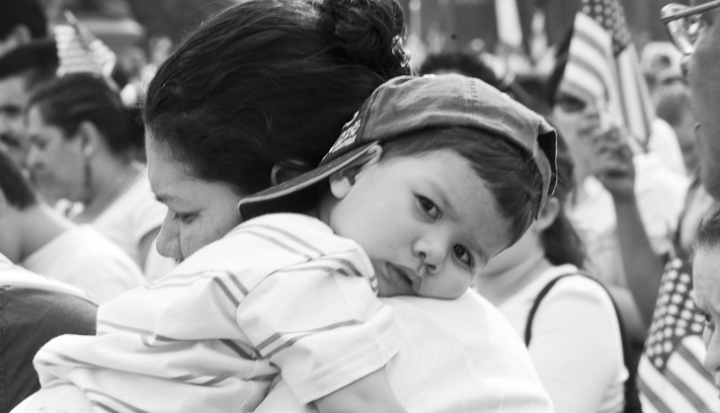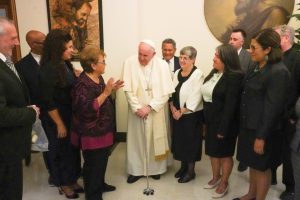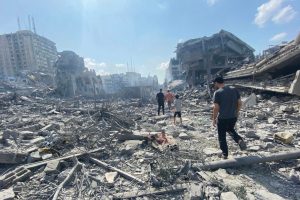Philadelphia, Pennsylvania is a city of great cultural diversity. I arrived here after working for 10 years with undocumented immigrants in Tennessee and Kentucky as a lay associate of the Glenmary Home Missioners. I knew I would continue to work with and for immigrants because of the profoundly deep experiences I had relating to them–that and the fact that I feel a deep connection with them being as I am the son of poor immigrants myself.
Four years later, my experience in Philadelphia has not diminished my admiration of the immigrants I have been privileged to work with. Take Agustin, for example. I have not seen much of him lately. After recuperating from devastating injuries, he has been working, working, working. He had a lot of lost time to make up. His aunt in Honduras needs the support he regularly sent her before he was disabled on July 28, 2011.
It was around 1 a.m. and Agustin was returning from working in a center-city Philadelphia restaurant. He had just cashed his $130 pay check and was on his bicycle about two blocks from his apartment, which he shared with five other undocumented Hispanic men.
Suddenly someone behind a tree used a two-by-four to knock him off his bicycle. Before the assailant left Agustin penniless, he shot him twice for good measure–once in the leg, shattering his femur, and once in the stomach. The Philadelphia police found him in the street and rushed him in their squad car to a nearby hospital. He spent the next 38 days there, going in and out of consciousness, unable to verify who he was since he carried no I.D.
Eventually the hospital, not knowing what to do with him, sent him out to the street with a walker. Far from healed, Agustin found his way home five hours later. His friends, having no idea where he’d gone, marveled that he had returned. He spent three days in a friend’s van until they could arrange with the landlord to let him stay there again.
Over the next year and a half, I was part of a team that worked with Agustin. As a minister in the Community Center of Visitation BVM Parish, I kept tabs on his progress and maintained regular contact with him, bringing him food and other kinds of assistance. Cathi Tillman, the director of La Puerta Abierta, a non-profit agency that offers free family counseling for undocumented immigrants, worked with Casey, a social worker, to get medical services for Agustin. HIAS, a Jewish immigrant service, advocated for him to get a U visa, a special visa for abused immigrants. The New Sanctuary Movement, an inter-faith organization with two Catholic churches in membership, began training him in leadership skills. Finally he got on his feet–no small feat, I might add.
Agustin is typical of the spirit of other undocumented immigrants, such as Teresa and Gerardo, a hardworking, faith-filled couple who are Visitation BVM parishioners. They have been in the United States for many years. In the last few years they have become staunch members of the New Sanctuary Movement and leaders in the community battling for justice and fairness for immigrants in Philadelphia.
Both of them have spoken at rallies conducted by the New Sanctuary Movement urging the city of Philadelphia to back off its relationship with ICE, the Immigration and Customs Enforcement agency of the federal government. Many undocumented immigrants have been detained and deported because of this program. Their son was one of them. Born in the United States, he was detained and deported several years ago to Mexico, a country where he had never lived. He was not guilty of a crime; he was in the wrong place at the wrong time.
The New Sanctuary Movement rallied behind another man two years ago and kept him from being deported and separated from his wife and two children. Francisco Rios was sitting on the steps of his house fixing a tail light of his car in North Philadelphia when a police office, mistaking him for a criminal, accosted him and bloodied his head. Francisco was arrested. He spent two weeks in jail before he gained release. Eventually he was tried and found innocent of all charges. He applied for a U visa, which he received in the fall of 2012. Ever since then, being a poor, uneducated but intelligent man trying to provide for his family, he has been working, working, working. Still, he finds time to give testimony at New Sanctuary Movement demonstrations.
Maria, a catechist and active parishioner, is another spokesperson at rallies and demonstrations organized by the New Sanctuary Movement. Her husband Rene is right there beside her, as is their daughter Sara, who recently applied for and was found eligible for Deferred Action for Childhood Arrivals (DACA), deferring deportation for her as an adult who was brought without documents to this country as a young child. Their family has undergone two invasions of their home. Maria came to this country to work and little by little with the money she earned was able to reunite with her husband and six children. Unfortunately, some of the family members were identified as “illegals” because they were suspected of drug trafficking or were identified through traffic tickets. It mattered little whether they were actually guilty of a crime.
The New Sanctuary Movement of Philadelphia exists to bring an end to the tie-in the Philadelphia Police Department has with ICE. It creates insecurity, not the condition the Secure Communities program of Homeland Security is supposed to bring. We are working to convince the Philadelphia city officials not to renew the contract with ICE on August 31, 2013.
A report in Al Día, a Philadelphia Spanish-language weekly (August 11-17, 2013) focuses on the reason why the New Sanctuary Movement recently conducted a 40-day fast among its member congregations.
Members of the New Sanctuary Movement held a 40-day fast in support of immigration reform. The purpose of the fast was to convince local authorities not to renew the agreement with ICE that allows it to have access to the police database called PARS (Preliminary Arraignment Reporting System).
Although the objective of the agreement is to find immigrants who represent a danger, this has been the object of criticism on the part of those who consider that its reach is indiscriminate and has led to the deportation of persons who are far from representing a serious menace to public safety.
Whether the two-year-long effort to curtail the city’s reporting to ICE is successful remains to be seen. It is nevertheless clear to many people of faith that we need to be more welcoming of immigrants. Certainly we need to stop reporting information to federal authorities that might lead to the harsh disruption of law abiding immigrant families.
The Jewish and Christian tradition of welcoming the foreigner in our midst, the goodwill of people of faith and the great heritage we have as Americans of opening up our hearts and our shores to poor immigrants makes a change in immigration law inevitable. We hope the inevitable will happen soon. In the meantime, we offer up this prayer: Lord, protect those whose only crime is to work, work, work for a better life.
Image: Flickr photo cc by Anuska Sampedro














Add comment